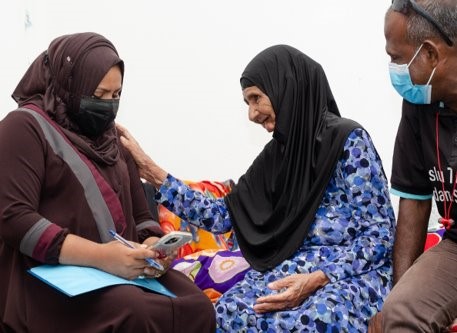A first in the world: Maldives joint COVID-19 and HPV vaccines post-introduction evaluation (PIE)
Maldives is one of the most geographically dispersed island nations in the world, consisting of 1192 islands grouped into 20 atolls, of which 187 islands are inhabited, with a total population of 545 847 (2021).
COVID-19 vaccine rollout in Maldives started in February 2021, applying the WHO Strategic Advisory Group of Experts on Immunization (SAGE) prioritization and guidance from the Maldives Technical Advisory Group on Immunization. Eligibility for primary series vaccination for COVID-19 was 12+ years and 18+ years for the booster dose. Maldives achieved more than 80% coverage for primary series COVID-19 vaccination among the eligible population.
In 2019, Maldives had launched a human papilloma virus (HPV) vaccine campaign, introducing the vaccine into the routine vaccination schedule for girls 10 years old. Maldives performed a COVID-19 post-introduction evaluation to evaluate the deployment of COVID-19 vaccines in the country together with a post-introduction evaluation of the HPV vaccine into the national immunization programme. The eight-day post-introduction evaluation process was conducted during December 2021 in seven atolls and the Greater Male’ region, and consisted of four steps:
- desk review of key documents;
- field visit to vaccination sites, including observations of cold and dry storage areas and of vaccination performance;
- stakeholder interviews with health workers, teachers, students, prioritized groups and community members facilitated by national technical advisory committees and operational groups involved in decision-making. Others interviewed included members of the Maldives Technical Advisory Group on Immunization, the National Adverse Events Following Immunization Committee, immunization partners, and developers of the COVID-19 vaccination web portal; and
- questionnaires administered to staff at health care facility level and to beneficiaries and caretakers at island health centres.
How did Maldives do it, and how did the WHO Secretariat support Maldives?
- Evaluation teams – These were comprised of international and national experts from WHO headquarters, Regional Office for South-East Asia, and country offices in the South-East Asia Region; the United Nations Children's Fund (UNICEF); Centres for Disease Control and Prevention; and MM Global Health Consulting. The teams also included programme managers from the Ministry of Health, national partners, and members of the Maldives Technical Advisory Group on Immunization and the National Adverse Events Following Immunization Committee.
- Customizing the post-introduction evaluation tool – The WHO Country Office in Maldives customized the WHO post-introduction evaluation tool integrating questionnaires for COVID-19 and HPV vaccines based on ten thematic areas. A specific questionnaire was developed for resort islands.
- Real-time data collection – The WHO Country Office developed a web-based software package for real- time data collection during the assessment. Extensive internet connectivity in Maldives allowed real-time data collection and dashboards with interfaces for computers / laptops, tablets and mobile phones.

Photo Credit: © WHO/Maldives
Photo Caption: Using mobile phones for real-time data entry with community engagement.
- Funding support – The WHO Country Office secured funding for joint COVID-19 and HPV vaccines post-introduction evaluation through Gavi COVAX.
The high coverage in both COVID-19 and HPV vaccination could not have been achieved without high level political commitment, demonstrated by His Excellency the Minister of Health, Ahmed Naseem, chairing the briefing and debriefing meetings which were attended by all senior officials of the health department, members of technical advisory bodies and immunization partners. A review of lessons learned revealed additional factors that contributed to success including multistakeholder collaboration; innovations in service delivery; equity in coverage by including expatriates and undocumented migrants; regulatory preparedness for emergency use authorization of COVID-19 vaccines; virtual trainings; the online vaccination portal; real-time tracking of vaccine safety and coverage; multi-pronged communication strategies; vaccine transportation to islands through air/sea transport; and a strengthened vaccine cold chain.
Strengthening human resources for immunization at all levels, monitoring and supervision for the central team under the COVID-19 situation particularly given the challenging island geography; and implementing a digital system for routine immunization are challenges to be addressed.
Recommendations were provided for each thematic area and the real-time web portal is available as a global good.
